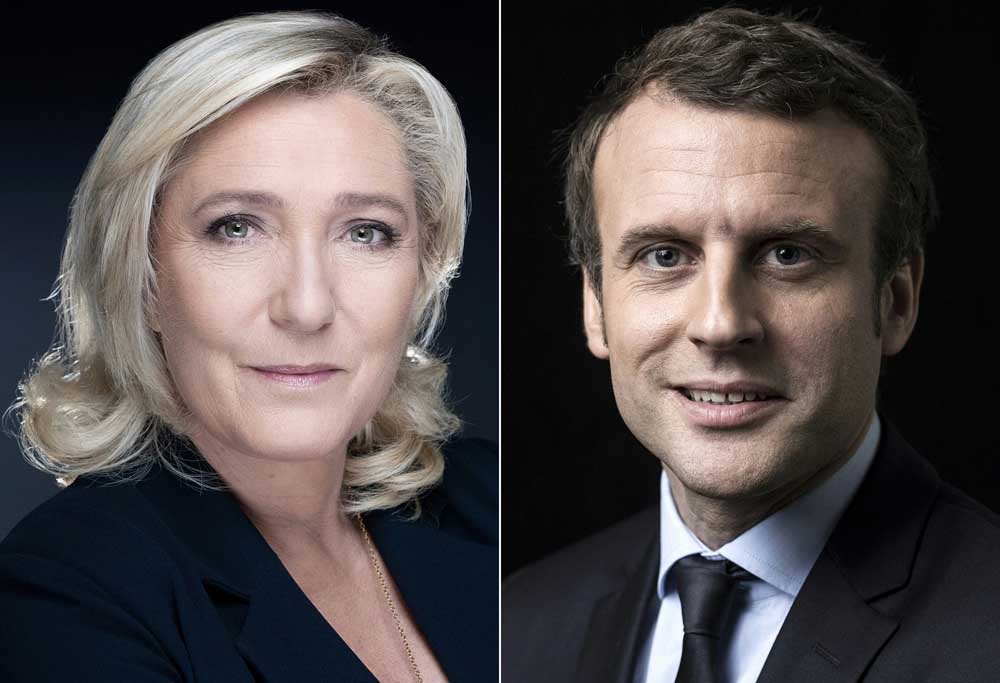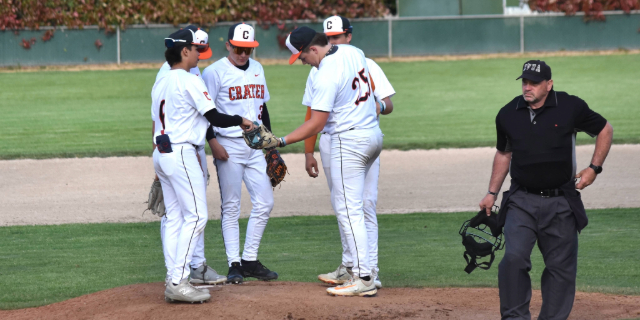Le Pen’s far right wins French first round and targets majority
Published 2:00 pm Sunday, June 30, 2024

- This combination of photographs created on June 16, 2024, shows French far-right party Rassemblement National (RN) party leader Marine Le Pen, left, in Paris on October 20, 2021, and France's President and French centrist political party Renaissance founder and Honorary President Emmanuel Macron, right, in Paris on March 7, 2017. (Joel Saget and Eric Feferberg/AFP/Getty Images/TNS)
Marine Le Pen’s National Rally dominated the first round of France’s legislative election and set its sights on an absolute majority as President Emmanuel Macron and her other opponents began strategizing to keep the far-right party out of power.
Trending
The National Rally was projected to get between 33% and 34.2% of the vote, according to projections from five polling companies on Sunday. The left-wing New Popular Front coalition was set to get between 28.5% and 29.6% and Macron’s centrist alliance between 20.3% and 22.4%.
Even though Macron’s presidency isn’t formally at stake – and he’s said he has no plans to resign – Sunday’s result indicates he’ll likely have to share governing responsibilities with Le Pen’s group, which opposes most of his priorities, from migration and pension reform to strengthening the European Union.
Speaking at an event in her constituency in northern France, Le Pen told supporters that Macron’s party had been “practically wiped out.”
Trending
“The second round will be decisive,” she said. “To lead the reforms that the country needs, we need an absolute majority.”
The euro was quoted marginally higher against the dollar as currency markets opened in Sydney.
The focus now will turn to whether the National Rally and its president, Jordan Bardella, can garner enough support in the second round of voting next Sunday to get an absolute majority in the National Assembly, which would allow it to easily pass legislation and bat down attempts to bring down the government.
The National Rally has said that it won’t lead the next government unless it has full control of the legislature. If it falls short, France could be looking at an extended period of gridlock.
The National Rally would need 289 lawmakers to have an absolute majority in the 577-seat lower house. But the electoral calculus gets complicated in the runoff when parties can strategically withhold candidates in certain constituencies to give a boost to a centrist hopeful.
Jean-Luc Melenchon of the New Popular Front said the vote was coming down to a competition between the left and the right, but also indicated tactical decisions could be used to bolster the center. He said in some cases where his group is in last place, it would pull out, in practice helping whichever party was best-placed to defeat Le Pen’s candidate.
Similarly, Macron’s Renaissance party said it would pull candidates where they placed third to help those who respect “the values of the republic” beat the far right. Macron also released a statement calling for “a broad, clearly democratic and republican alliance for the second round.”
Le Pen “is at the gates of power,” said former President Francois Hollande, who ran as a candidate for his Socialist Party. “We have an urgent duty to stop the far right gaining a majority.”
In a sign of the high degree of uncertainty, there may be as many as 320 three-way races in the second round, at least initially, according to projections by polling company Elabe. Last time around in 2022 there were just eight.
Markets have been in turmoil since Macron called the snap election on June 9, leading to the worst bond rout since the sovereign debt crisis and erasing nearly $200 billion from the value of French stocks. The extra yield investors demand to hold 10-year French debt over similar German government bonds rose to 86 basis points on Friday, the most since 2012.
During the two-week campaign, Bardella sought to assuage voters by saying the National Rally would take a responsible approach to economic policy, but offered little in the way of detail. Some of his proposals include cutting taxes on electricity, gas and fuel and undoing Macron’s pension reform that boosted the retirement age.
And while the National Rally no longer supports leaving the common currency — a position that’s proven deeply unpopular — it has put forward several proposals that would cause problems with the European Union, such as a plan to renegotiate the bloc’s electricity market pricing and reducing the amount of money France pays into the EU budget.
European leaders have been keeping a close eye on the election, which could have an enormous impact on sensitive EU policies that will be negotiated in the coming months, particularly related to Ukraine and defense spending.
“I’m worried about the elections in France, I want to say that explicitly,” Scholz said in an interview with ARD public broadcaster a week ago. “I hope that parties that are not Le Pen, to put it that way, are successful in the election. But that is for the French people to decide.”
Far-right parties have been gaining ground across Europe and placed among the top three in nearly half of the countries in this month’s EU elections. Among the winners was Italian Prime Minister Giorgia Meloni’s right-wing Brothers of Italy, which got nearly 29% of the vote. And Germany’s anti-immigrant Alternative for Germany finished second ahead of Scholz’s Social Democrats.
Macron’s party lost its absolute majority in the National Assembly in the legislative ballot that followed his reelection for a second five-year term in 2022. Since then he has attempted with mixed success to get support from the Republicans to pass legislation, otherwise relying on decrees that bypass a vote.
Macron’s government and the National Rally have already started arguing over who would control certain areas of policy if they ended up in a government together. Le Pen last week pushed back against Macron’s plan to nominate Thierry Breton for another term at the European Commission, the EU’s executive arm, arguing that the prime minister is responsible for that decision.
_____








